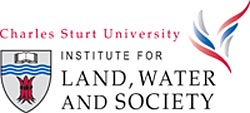 Each community in the Murray Darling Basin should have a greater say in how they react to the decreasing availability of water around them, according to a group of CSU researchers who work extensively with these communities on issues such as drought and soil salinity.
Each community in the Murray Darling Basin should have a greater say in how they react to the decreasing availability of water around them, according to a group of CSU researchers who work extensively with these communities on issues such as drought and soil salinity.“The Federal Government has allocated $9 billion to help reduce water being taken from water sources in the Murray Darling Basin in the Water for the Future program,” said a spokesperson for the CSU group, Dr Jonathon Howard.
“While the Wentworth Goup of Concerned Scientists recently released a report suggesting more resources need to be provided to help communities cope with less water, we think they did not go far enough.
“Each community is different and there is no simple solution to how they can address the effects of climate change on South East Australia, which appears to include increasing incidence of drought,” said Dr Howard, a researcher with CSU’s Institute for Land, Water and Society (ILWS).
“Our group, which works and lives in the region, proposes a flexible plan that communities themselves drive changes. They know their history, capacities, the local issues, and their potential to manage change.”
The group has proposed five principles be used to help each community to decide how they adapt to declining water.
- The community sets a guiding image for its future: As the reduction for water allocation is decided for each catchment, each community is helped decide on its own future. They have a democratic right to decide on their futures – they have to live with it.
- The ecological condition of the local environment is enhanced: The move to more sustainable use of water involves transferring burdens and benefits to sectors of the community. This will require considerable monitoring of complex river systems according to levels that need to be agreed by that community, requiring a sound business approach to help manage community expectations.
- Focus on building resilient communities in the Basin: Building resilience will help communities cope with the shocks and ride out the changes that will come with water reallocation. Communities will need to be redirected towards opportunities.
- Processes and decisions are fair: Water reallocations will affect the social fabric of communities that will need major individual changes. The current Water for the Future plan allows the market to decide where water will come from, but overseas experience shows the market approach has little regard for effects on communities and individuals. Communities should have a greater say in planning and decisions.
- Those facilitating change apply adaptive management: Adaptive management means learning from our experiences. Communities need to be able to use adaptive management to learn from the policy and management decisions made to manage water. They should be allowed to learn from positive and negative projects from elsewhere.
Dr Howard said governments need to “identify the most cost-effective and timely approach to deliver the required volume of water while helping businesses and communities to capitalise on opportunities and adapt to a future with less water”.
“Social and ecological systems are intimately linked. Water reform needs to connect policy, management and practical projects with human livelihoods. If we fail, we will embed social injustice, mortgage the wealth of future generations and have less room to move in the future.
“We must act now and bring Basin communities with us,” he said.






Social
Explore the world of social